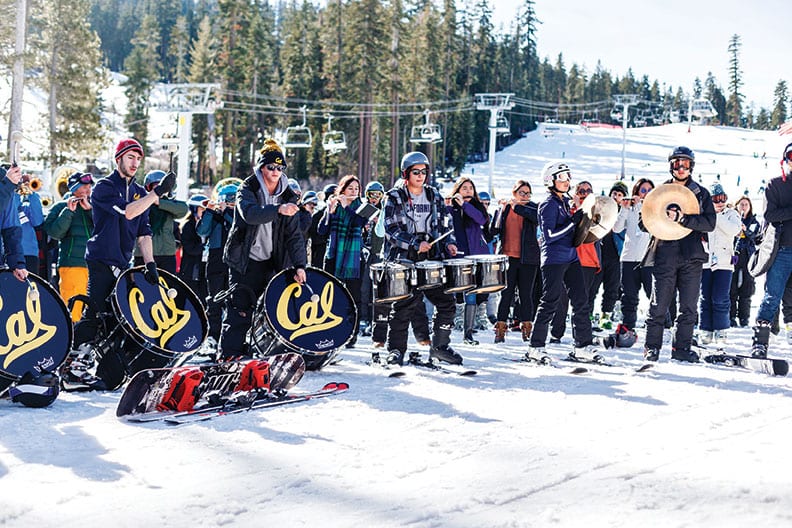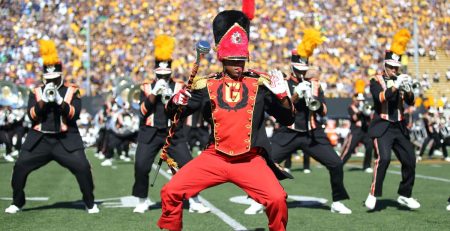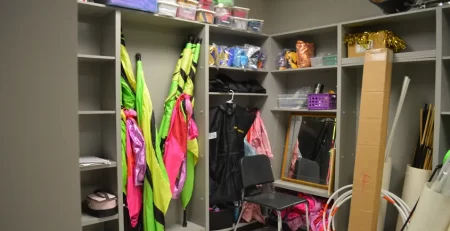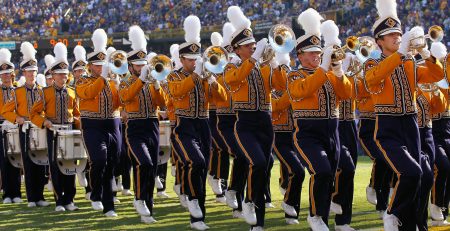
24
Oct
Winter is Coming
It’s October! State band competitions, the end of high school football, and the middle of college gameday are upon us! With BOA Grand Nationals only 3 weeks away, schools are pushing through the end of the season with drive and intensity! As the sun sets earlier and pumpkin spice makes an appearance in the hands of staff members, the kids may begin uttering thanks (finally!) for the thick wool/poly-blend uniforms they wear on the weekends.
But what about rehearsals? As the chill of fall and hints of winter start becoming a factor in rehearsal preparations, let’s talk about some important safety precautions we can take to ensure that students are as prepared for the cold as they are for the heat.
A Chill is in the Air.
If you’re from the Midwest or the North East, snow, or at least extreme cold temperatures, are a mainstay of your existence. It’s common to hear Midwesterners say that fall lasts a week, winter lasts 6 months, and spring may decide to show up for a day. However, our body’s reaction to heat and cold is entirely relative. While the South and Pacific West think 60 degrees calls for puffy jackets and layers, someone in Wisconsin sees 60 and rushes to open the lake house for the summer! The same applies to our perception of hot temperatures.
With that said, nearly everyone in marching band will experience the “cold part” of the season. From students to staff, important safety measures need to be considered when planning for rehearsals toward the tail end of the season. Cold conditions, raise a serious risk for performers and staff alike. In order to maintain peak performance and drive the final push of the season, staff need to know the risks cold weather poses and how to prevent injury/illness due the cold.

Tips and Tricks.
The NFHS Band Safety course outlines guidelines and tools needed to understand cold weather risk and how to mitigate it.
- Dress for success. Wear layers of loose fitting, warm clothing. The loose fit allows moisture from sweat to stay away from the body and prevents further chill from setting in. It is important to wear layers as opposed to one thick layer as well. This creates pockets of warmth and additional chill barriers. Wearing a hat will prevent needed heat from escaping the body as well.
- Frostbite affects small, exposed body parts (particularly relevant for woodwinds, percussionists, and color guard who all rely on the dexterity of their hands). Frostbite begins with extremely cold, red skin and worsens to hard, numb, pale skin. Instant hand warmers and employing “play rotations” are effective ways to mitigate this risk.
- Hypothermia occurs when “the body temp drops below 96 degrees, and can occur in outdoor temps as warm as 60 degrees.” It is important to recognize the onset of hypothermia in performers and fellow staff members. If frostbite or hypothermia seem to be a threat, remove the individual from the cold and seek help immediately. To learn more, enroll in the free course.

- The body burns more calories in cold weather than it does in warm weather. Performers should ensure they are eating a nutritious diet. Additionally, eating hot foods and drinking warm liquids prior to rehearsal can help the body stay warmer longer. This can also help mitigate the risk of hypothermia.
- If in doubt, move rehearsal inside to safeguard against potential injury.
Other considerations and mitigation.

- Encourage performers to change out of their performance attire and into clean, dry clothing as damp clothes will make students colder.
- Do not advise students to cup their hands and blow air into the void. This creates moisture in the hands which, when re-exposed to the cold, will cool off making the student more uncomfortable.
- Wear socks that are made of wool and are thick. However, ensure shoes are not too tight-fitting with thicker socks. Like clothing layers, if feet are plastered tightly to the inside of the shoes, moisture has nowhere in which to escape, and frostbite will be more likely to occur.
- Dry and windy conditions associated with cold temperatures can cause the lips to become numb, chapped, and cracked. This can cause extreme discomfort to all band members, but especially wind players who must continue to play their instruments. The resulting pain and numbness diminishes the strength and endurance of a player’s embouchure which can lead to short term technique errors, poor performance (musically and physically), and further injury. Applying quality chap stick or wearing a scarf that can cover the mouth in cold or windy conditions can help prevent against this issue.
- Frozen mouthpieces are also a concern in cold conditions. If possible, students can use plastic mouthpieces as opposed their traditional metal counterparts. However, if this is not possible, it is advised to store the mouthpiece in their pocket when it is not being played.
Hydrate!

- Yes, you still need it, even in cold conditions! While students may not feel thirsty, there is still physical exertion happening. It is vital that in order to replace the fluids lost through sweating, students are given and taking advantage of frequent water breaks. Replacing lost electrolytes is also vital.
Arriving in One Piece.
Proper preparation for cold weather is vital even when the performers and staff members are not yet at rehearsal. This is especially important for winter guard rehearsals and pep band gigs. Parents can help educate their young drivers on safety in cold and winter weather conditions.
- Know winter car maintenance, including proper tires, fluids, and safe driving control.
- Carry an emergency bag filled with extra warm weather accessories, snacks, water, and blanket.
- Cold weather doesn’t always mean snow and ice, but if your region encounters winter weather conditions during the rehearsal season, ensure you or your performer can identify and avoid accidents related to ice.
- Encourage your student to leave home earlier than normal so a safe speed can be maintained.
Learn More.
Taking care of your body and demonstrating preparedness no matter the conditions will pay dividends in the end for you and your program. No matter if you’re wrapping up the marching season, preparing for winter bowl games, or heading to winter guard rehearsal, it is important to heed the weather and armor your body against uncomfortable conditions. For more information on this topic or for additional resources regarding cold weather risks, mitigation, and more, enroll in the free NFHS Band Safety Course!



